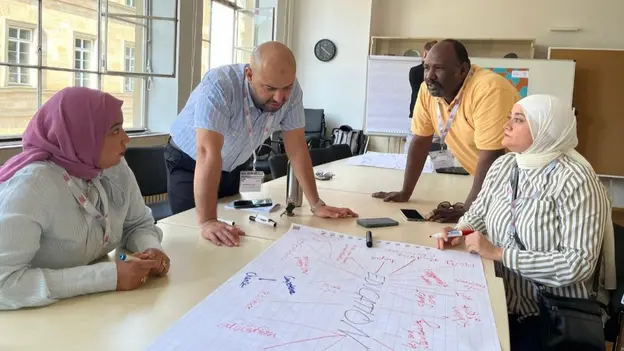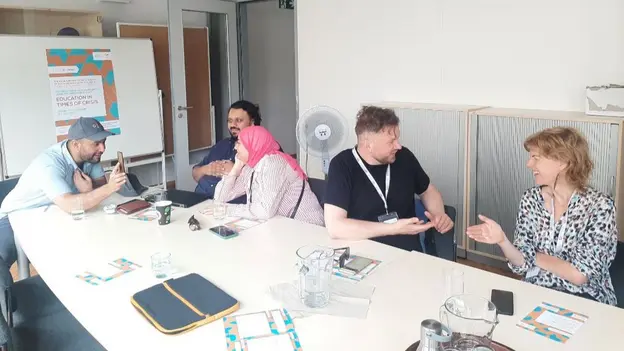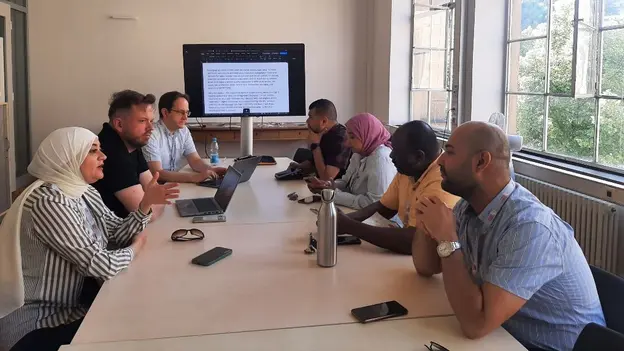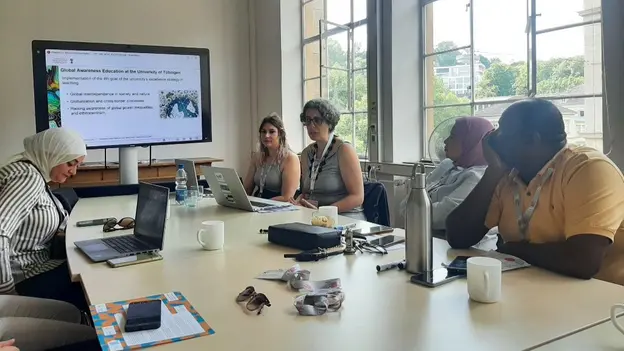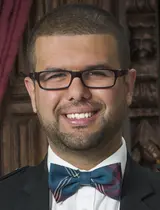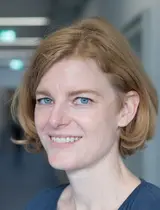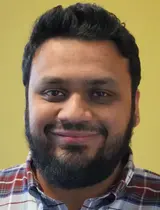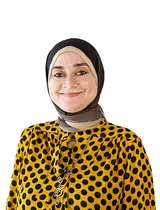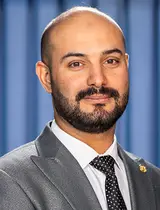Working Group Meeting
Resilient Learning: Approaches to Education in Times of Crisis
Interdisciplinary Workshop
In response to the various global challenges disrupting education systems – from political conflicts to climate change and pandemics – the AGYA Working Group ‘Arab and German Education‘ convened for a two-day meeting at the University of Tübingen. Under the title ‘Education in Times of Crisis’, the event brought together AGYA members and academic partners from the University of Tübingen to collaboratively rethink education systems for resilience and inclusion, and address critical gaps and urgent needs in crisis-affected regions.
Adopting a Life-Span Perspective on Education
A key topic of the meeting was the development of a life-span education framework in crisis settings. Discussions emphasized the differentiated impact of crises on learners across age groups – from early childhood to adulthood – and the need for targeted, developmentally appropriate learning opportunities at each stage.
The meeting evolved from the assumption that long-term disruptions in access to education, especially during formative years, create cascading effects on individual and societal well-being. Older adults, too, require continued access to education for social integration and mental health – issues often neglected in crisis discourse.
Crises may close classrooms, but they cannot erase the will to learn. Resilience in education is built when scholars, institutions, and communities come together across borders. Time and again, AGYA builds bridges between challenge and possibility.
Ahmad Amro, AGYA alumnus
Mapping the Landscape: Education Amid Polycrises
A central component of the meeting was the collaborative effort to map the contemporary landscape of education in crisis contexts. First-hand experiences from AGYA members and alumni grounded the discussions in practical realities. Through case studies presented by AGYA members Dr. Abdulsatar Sultan from Iraq and Prof. Dr. Tilal Abdelhalim from Sudan, as well as by AGYA alumnus Prof. Dr. Ahmad Amro from Palestine, the group examined how armed conflicts, economic collapse, and public health emergencies disrupt education systems, and which demographic groups are most vulnerable to educational exclusion.
Discussions also focused on how digital infrastructures can be leveraged for crisis-resilient education, and what current policy and support frameworks exist for scholars at risk. In this context, the group also reviewed best practices from humanitarian education responses, particularly in refugee and displacement contexts.
For scholars at risk, AGYA is more than a network – it is a platform that amplifies our voices, strengthens collaboration, and turns our lived experiences into actionable solutions for researchers and communities in need.
Tilal Abdelhalim, AGYA member and Scholar at Risk
Digitalization and Transdisciplinary Solutions
The meeting placed a special emphasis on the role of digital education in providing access, continuity, and adaptability in fragile contexts. Participants discussed actionable ideas and shared insights into context-sensitive digital tools that could serve as lifelines for learners and educators alike when traditional infrastructures fail.
With a comprehensive map of education challenges in crisis-affected contexts, the meeting was an important contribution to advancing research, policy, and collaboration on education in emergencies – and to supporting the academic community in and beyond the Arab world.
Digital education solutions in crisis contexts must be built at the intersection of technology, pedagogy, and local knowledge. This transdisciplinary approach ensures that when infrastructure fails, learning does not.
Sascha Hein, AGYA member
- Disciplines Involved
- Architecture, Chemistry, Computer Science, Education, Engineering, Literary Studies, Mathematics, Musicology, Pedagogy, Pharmacology, Philosophy, Medicine, Sports Science
- Cooperation Partner
- University of Tübingen, Germany
- Venue
- University of Tübingen, Germany
- Year
- 2025
- Funding Scheme
- Working Group Meeting
- Working Group
- Arab and German Education
- Countries Involved
- Germany, Algeria, Iraq, Sudan, Palestine
